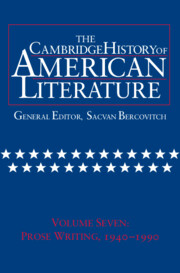Book contents
- Frontmatter
- Introduction
- The Drama, 1940—1990
- 1 Introduction
- 2 Tennessee Williams
- 3 Arthur Miller
- 4 Edward Albee
- 5 Sam Shepard
- 6 David Mamet
- 7 Changing America: A Changing Drama?
- Fiction and Society, 1940–1970
- After the Southern Renascence
- Postmodern Fictions, 1960–1990
- Emergent Literatures
- Appendix: Biographies
- Chronology, 1940–1990
- Bibliography
- Index
4 - Edward Albee
from The Drama, 1940—1990
Published online by Cambridge University Press: 28 March 2008
- Frontmatter
- Introduction
- The Drama, 1940—1990
- 1 Introduction
- 2 Tennessee Williams
- 3 Arthur Miller
- 4 Edward Albee
- 5 Sam Shepard
- 6 David Mamet
- 7 Changing America: A Changing Drama?
- Fiction and Society, 1940–1970
- After the Southern Renascence
- Postmodern Fictions, 1960–1990
- Emergent Literatures
- Appendix: Biographies
- Chronology, 1940–1990
- Bibliography
- Index
Summary
At the end of the 1950s, the American theater seemed to have lost its direction. Miller, it appeared, had ceased to write. Tennessee Williams was on the verge of annihilating himself in what he was later justifiably to call his “stoned decade.” The initiative seemed to have shifted to the other side of the Atlantic. Where earlier, those in the British theater had been enthused and challenged by the remarkable flowering of American dramatic talent that had marked the decade from 1945 to 1955, now they generated their own talents, who brought a new energy and purpose to that theater. In America, the dominance of Broadway was undermined by its peremptory economics, a declining urban setting, and the increasing power of a dwindling number of newspaper reviewers. An audience that had once supposedly been homogeneous now showed signs of fragmenting. As is often the way, decay concealed new life, however. By 1959, Off-Broadway had become a significant force. For the first time, the Ford Foundation began to put money into the theater and a number of productions pointed the way forward into the 1960s and beyond. As political power began to move to a new generation, so also did theatrical power. In 1959, Arthur Miller was forty-four, Tennessee Williams was forty-eight, and Eugene O’Neill was six years dead (though Long Day’s Journey into Night had not been produced until 1956 and A Touch of the Poet and A Moon for the Misbegotten until 1957, with productions of Hughie still lying ahead in 1964 and of More Stately Mansions in 1967).
- Type
- Chapter
- Information
- The Cambridge History of American Literature , pp. 44 - 51Publisher: Cambridge University PressPrint publication year: 1999

